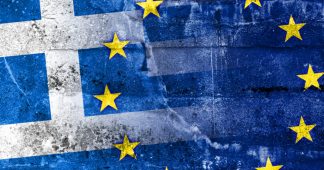January 7, 2019
Ambassador Leonidas Chrysanthopoulos will be known to many CIB members for his authoritative accounts of the tragic effects of EU austerity on Greece, not least the resulting humanitarian crisis and spiralling death rate (see for example his memorable speech at our 2017 annual rally). In his most recent despatch he describes the dark methods used by the Eurogroup, the informal group of finance ministers of the Eurozone, to bully and pressurise Greece during the first six months of 2015, as described by her then finance minister Yanis Varoufakis. Many of the despicable EU techniques of which he complains will be all too familiar to Brexiteers: lies, treachery, blackmail, mass media manipulation… Worst of all, these servants of the Euro-state knew very well that the policy they were forcing on Greece could not work. The Greek people were to be sacrificed to the political goals of the Eurozone.
Former Greek Finance Minister Yanis Varoufakis’s memoir Adults in the Room: My Battle with Europe’s Deep Establishment provides a first-hand account of the disgraceful methods employed by the members of the Eurozone and the EU against Greece in order to obtain the third Memorandum of Understanding on financial assistance (MOU). It was Varoufakis who negotiated with the ‘Troika’ (the triumvirate of the European Commission, the European Central Bank (ECB) and the International Monetary Fund (IMF)) during the early months of 2015.
The EU’s methods indicate how tough the future liberation government of Greece will have to be. Forewarned is forearmed. We can learn the lessons and be prepared.
The Eurogroup is an informal group comprising the Eurozone’s ministers of finance. During the first six months of 2015, when the country was de facto considered an ‘enemy state’, the Eurogroup used the following methods against Greece:
- Extreme verbal pressure
- Effective blackmail
- Non-truths
- Use of Greek turncoats
- Pressures to third countries to abstain from financing Greece
- Use of major European mass media networks for a disinformation campaign against Greece.
Let us consider in turn how the Eurogroup employed each of these tactics.
- Extreme verbal pressure
On 30 January 2015, following the first meeting of the Eurogroup with the Greek Finance Minister, Eurogroup president Diijsselbloem issued the following ultimatum: “The current programme must be completed or there is nothing else.” On the margins of the first Eurogroup meeting in 2015, Christine Lagarde, the IMF’s Managing Director, told Varoufakis:
“These targets they insist on can’t work [referring to the Troika programme on Greece]. But you must understand that we have put too much on this programme. We cannot go back on it. Your credibility depends on accepting and working with this programme.”
So the IMF expected the Greek government to implement a damaging programme that everyone involved already knew wouldn’t work, just so the Troika could save face. As usual with the EU, politics was put before economics, and before people’s welfare.
In March 2015, during a meeting with Klaus Regling, head of the EFSF, Varoufakis asked him the following question:
“Given that, as it seems, in a week or two we shall run out of money with which both to repay the IMF and to pay salaries and pensions, what do you advise me to do, Klaus? The choice is between defaulting on the old and frail or defaulting to the IMF. Which is of course an unnecessary dilemma given that the European Central Bank (ECB) owes us a similar amount.”
He received the following reply: “You must never, ever default to the IMF. Suspend all pension payments instead. This is what you must do.” What a wonderful example of the EU’s social policies!
Just before the Eurogroup meeting of 27 June 2015, Varoufakis met with Dijsselbloem, Weiser and Sapin, who pushed him to cancel the Greek referendum on whether the government should accept the Eurogroup’s austerity conditions.
Another practice undermining the Greek position occurred whenever the Greek minister took the floor during Eurogroup meetings and presented concrete compromise proposals. A silence usually followed, organised on purpose, where no other minister took the floor to comment on the proposals, thus allowing Dijsselbloem to close the discussion with negative conclusions.
- Εffective blackmail
Effective blackmail was committed by the European Central Bank against Greece, particularly by its President Mario Draghi. In the meeting that Varoufakis held with him on 4 February 2015, having listened to the Greek proposals, Draghi replied by saying:
“And I must tell you that recent developments in Greece are putting us in a difficult position. Later today our governing board is meeting and it is very likely that your waiver will be withdrawn.” [The waiver allowed the ECB to provide Greek banks with liquidity in return for junk collateral.]
The decision was taken that same evening: Greek banks were excluded from this liquidity and could now only get liquidity via the Emergency Liquidity Assistance (ELA), which was more expensive. Nor did the governing board of the ECB revoke its previous decision at its meeting of 4 March, even though the loan agreement had been extended until 30 June by the Eurogroup tele-conference of 24 February, which was a precondition for bringing back the waiver. When on 27 June the Eurogroup rejected the extension of the loan agreement until 30 July to enable the referendum to take place on the 28th, the ECB Board revoked the ELA facility of the Central Bank of Greece, in an effort to influence the outcome of the referendum.
- Non-truths
Αfter the impasse of the Eurogroup of 27 June 2015, Dijsselbloem announced that for the first time there would be a joint communique without the agreement of Greece. He added that Greece would not participate in that afternoon’s meeting. Varoufakis then asked the Secretariat: “Is the Eurogroup president at liberty to issue communiques when there is no unanimity and also to exclude finance ministers at will from Eurogroup meetings?” The reply was:
“Minister, the Eurogroup does not exist in law, as it is not part of any of the EU treaties. It is an informal group of the finance ministers of the Eurozone member states. Thus there are no written rules about the way it conducts its business and therefore its president is not legally bound.”
The reply was simply untrue. Protocol 10 of the EU Treaty in its articles 1 and 2 mentions the informal meetings of the Eurozone’s finance ministers. Had Varoufakis insisted, he could have remained in the meeting, although it would not have changed anything.
On the evening of 4 February Varoufakis was scheduled to have a secret dinner with Jorg Asmussen and Jeromin Zettelmeyer, both key players in SPD (the German Socialist Party). As Varoufakis writes:
“The purpose of the dinner was ostensibly to build bridges between the Syriza government and the section of the German government controlled by the Social Democrats… The agreement was that I would go to the restaurant alone incognito and by cab, and that I would not tell anyone we were meeting. The implication was that it would backfire on all of us if word leaked… Just as I was ready to leave my hotel room, I received an email from Jeromin telling me that they had changed the restaurant booking because the original restaurant was too public, confirming once more the importance of discretion.”
Sometime later Asmussen’s phone rang. Without saying anything, he passed the phone to Varoufakis. It was Draghi, who announced to him the withdrawal of the waiver. It seems that all Berlin knew who Varoufakis was dining with that night.
- Use of Greek turncoats
Varoufakis mentions two strong supporters of the Troika. The first was the Governor of the Bank of Greece, Y. Stournaras, who from his position did everything possible to support Troika policies. The second was G. Chouliarakis, who was the Troika’s man in the Eurogroup and President of the Council of Economic Advisors. He represented Greece in the working group of the Eurogroup, and as a close advisor to Varoufakis did everything possible to undermine his work. Today he is alternate Minister of the Economy.
- Pressure on third countries to abstain from financing Greece
China came under particularly strong pressure not to assist Greece. Varoufakis writes:
“The intention was to restart the formal bidding process for the port of Piraeus under the new conditions that the Chinese had accepted, while behind the scenes the two governments agreed the Chinese loans to the Greek state… First Beijing would inject the remaining 1.4 billion euros of the promised 1.5 billion into our T-Bills [Treasury Bills]. Almost simultaneously the Deputy Prime Minister Dragasakis would make a formal trip to Beijing to strengthen relations between the two governments and informally seal the agreement. Lastly Alexis (Tsipras) would follow up with a full state visit in April or May to make public and sign the comprehensive agreement between Athens and Beijing.”
But in the event, China purchased only 200 million euros of T-Bills. To quote Varoufakis again:
“The next day Alexis relayed the news from Beijing. Someone had called Beijing from Berlin with a blunt message: ‘Stay out of any deals with the Greeks until we are finished with them.’”
In a footnote Varoufakis observes:
“Also lost was Beijing’s readiness to help the Greek state get back on its feet (by buying government bonds) against the day it regains solvency. In other words, Greece lost a strategic industrial partnership that went far beyond a port deal.”
What a fine example of European solidarity!
- Use of major European mass media networks to discredit the Greek Government
The EU mobilized major mass media networks to discredit the Greek government from the outset, and to perform character assassination against Varoufakis. He writes:
“Of course, it was the worst-kept secret in Brussels and beyond that I was to be targeted in this way. In early February 2015, around the time of my first two Eurogroup meetings, some Greek journalists were told as much by a reporter with first-hand knowledge of the campaign. One of those Greek journalists later reported the conversation. ‘Will Mr Varoufakis be able to survive the pressure?’ asked the reporter. ‘At least Mr Tsipras still trusts him,’ the Greek journalist replied. ‘Then inform them in Greece, both the government and the people, that they can expect even more of these attacks,’ he said.”
Which is exactly what happened. This can be called ‘freedom of a manipulated mass media.’
After such treatment, one may ask why Greece is still in the Eurozone and in the EU. An entire country has been destroyed in order to implement economic policies that all those involved knew would not work. Even Wolfgang Schauble admitted it. When asked by Varoufakis if he would sign the memorandum if he were in Greece’s situation, he replied in a moment of sincerity: “As a patriot, no. It is bad for your people.”
In order to get rid of the bonds of the Memoranda, Greece must rely only on itself and on its people. Only when freed from these bonds may we expect effective assistance and co-operation from other countries.











